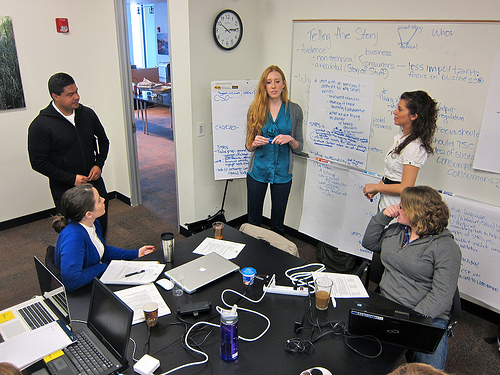

College is no longer a privilege reserved for the richest, brightest, or most powerful, in fact, a staggering 70% of Americans now at least attempt college, and beyond that about 40% of working age Americans have college degrees. What this means is that the college degree is no longer the serious advantage that it used to be.
Of the 9 million Americans who are currently unemployed, 4.7 million went to college and 4.3 million did not go to college. For the first time in history, the majority of the unemployed are people who have attended college. Of course, this statistic includes all those who attended college, whether they graduated or not, which includes the 50% of college dropouts.
Regardless, even if you do graduate, the outlook is still grim. As of 2023, The Economic Policy Institute reported that around 8% of college graduates between the ages of 21 and 24 were unemployed, which is over 2% higher than the national unemployment rate. Even more frustrating is recent research suggesting that even when college graduates land jobs, they are jobs that aren’t worth the price of a college diploma.
Of the 41.7 million working college graduates from the class of 2023, 28% worked jobs that required less than a bachelor’s degree experience, and 6% of those didn’t even need high school diplomas for their job positions. Considering all these startling discoveries, prospective students are worried about investing time and money into college if the rewards are unreliable at best.
In this article we will explore the most dynamic majors, that is, the areas of college-level study that are most adaptive to the current state of economic instability and offer college graduates the most and the best opportunities. In today’s economy individuals striving for success do whatever they can to stand out and demonstrate their capabilities, and declaring the right major can do just that. These majors were selected due to starting salaries, median mid-career pay, industry growth, job availability within the industry, and the number of opportunities associated with the major. Some of these majors are very specific and specialized, while others are a general study of a certain subject.
Specific and specialized majors often offer more in terms of stability and salary, while the broader areas of study offer more diverse and numerous career paths. Ultimately, whether a major is dynamic or not the results are determined by the individual.
1: Biomedical Engineering

One of the greatest times for an industry is when demand exceeds supply, meaning that the industry can expand to meet the demand. In the case of biomedical engineering, research facilities and engineering firms across the country are scrambling to make use of the booming advances in bioengineering technology.
Because this is an incredibly new industry, it offers the greatest opportunities for growth and expansion, meaning there is more than enough room for aspiring biomedical engineers. Starting median pay is listed at $63,420 with a median mid-career pay of $99,550. Projected job growth over the next decade is a whopping 61.7%.
While this major is one of the most focused compared to other majors on this list, there are still many paths within the field. Recent college graduates with a degree in biomedical engineering can expect research opportunities, biomedical supplies sales positions, and biomedical engineering firms eager for new minds.
Engineering itself is one of the safest choices one can make in choosing a college major. As technology advances by leaps and bounds each year, engineers work hard to keep up and produce new designs and technology. The ever-steady growth of the medical industry coupled with the extremely fast-growing biomedical supplies industry makes the biomedical engineering specialization one of the best available if you’ve got the mind for it.
Its no surprise that Forbes has named biomedical engineering the most valuable major currently. Prospective students interested in this career path should explore universities that maintain working relationships with biomedical research facilities and hospitals. The nation’s top-ranked biomedical engineering program is offered at John Hopkins University.
2: Computer Science

Many people would agree that we live in the age of computers. Computers and internet technology have literally changed the face of our planet and our everyday routines. Computers, the internet, and software are intertwined with nearly every industry on the planet and because of this those with a computer science degree have immense opportunities ahead of them. Granted they will be confined to a certain type of work–whether it’s coding, programming, or software/hardware design– but they can conduct this work across a vast variety of contexts.
Also, computer science is one of the greatest foundations for entrepreneurial pursuits because it provides the skills necessary to navigate webspace and utilize internet and software infrastructures that are crucial to the success of new businesses. Starting median pay is listed at $78,190 with the median mid-career pay at $136,620.
The industry is expected to grow by around 23% over the next decade. Recently graduated computer scientists can expect opportunities in teaching, self-employed contracting for companies that outsource tech positions, software engineering companies, technical support positions, computer technology sales positions, game designing, computer and mobile device app development, and many more.
While some of these opportunities may require more than a simple computer science degree, they are still readily available with the right experiences, which can often be gained through undergraduate internships. Computers and the internet are only becoming more important as time goes on, so for any computer gurus out there–the computer science degree is a better choice than it ever has been before.
3: Psychology

A degree in psychology can take you many places, however, many look at some of the employment statistics of the industry and assume there are better paths to be taken.
The 2022 average median pay of all psychologists was $85,330, and because there are so many diverse career paths for recently graduated psychology majors there is little helpful research on what they can expect in terms of entry-level salaries. While the major itself may not seem to have the high salaries and job growth like others on this list, it provides an unparalleled level of diversity in career paths, and thus offers a much larger number of potential jobs.
Psychology at its heart is the study of the mind, and the mind is the source of every action and every hour of work put into any job since the beginning of time. For this reason, psychology is one of the most attractive undergraduate backgrounds to employers in many different job types.
For those committed to psychology, there are an enormous number of specialties and interests aspiring psychologists may pursue: clinical psychology, sports psychology, neuropsychology, industrial psychology, forensic psychology, and social psychology. According to “Complete Psychology” by Graham Davey (2007), however, only about 15–0% of those with a psychology degree go on to become professional psychologists. Many put their knowledge of psychological principles to use in other fields such as marketing, business, advertising, human resources, business management, criminal justice, education, politics or public affairs, and many others.
While other majors in this list provide stability and guaranteed wealth, psychology offers diversity and guarantees the ability to follow your interest into whatever field suits you best. The downside is, however, that the psychology degree is incredibly popular. It ranks as the third most popular area of study at the undergraduate level. What this means is that students aspiring to reach high-level positions and weighty salaries must distinguish themselves in many ways, because the degree alone is not enough as it is in some cases.
4: Environmental Engineering

After the industrial revolution, nuclear plant explosions, an exponential increase in carbon monoxide, and the general trend of mankind polluting the planet Earth, there is great need for an industry devoted to repairing such damage. And as more countries become developed nations, they no longer need to focus on expansion and development and instead shift their focus to sustainability.
Sustainability is the mantra for countless industries: auto-mobile companies are seeking a greener alternative to gasoline, industrial factories are held to strict environmental codes and guidelines, ever-shrinking rain forests and wildlife reserves require constant attention, etc. and at the center of this trend is the environmental engineer. As sustainability and the reduction of environmental hazards become hot topics in economics and politics, environmental engineering grows as an industry and becomes more lucrative to its members.
Starting median pay is listed at $60,020 with a mid-career median pay of $96,530. While job growth is projected at 6% for the next decade, growth in pay is estimated to be 44%. Students graduating with an environmental engineering degree can explore a wide variety of opportunities at wildlife preservation agencies, environmentalist advocacy groups, federal environmental inspection firms, teaching positions, wild-life protection volunteer groups, and at architecture and engineering firms.
Nobody is going to make any more land any time soon, which means that there will always be the demand for environmental engineers to fix and preserve what little we have left.
5: Geology

Often considered mundane or written off as “the study of rocks” the geology major is actually an incredibly dynamic and very safe choice. Natural resources are the most valuable thing on this planet and are the foundation for hundreds, if not thousands, of industries, and geologists are the key to taking advantage of natural resources.
Starting median pay sits at around $49,150 with a mid-career median pay of $87,480. Projected growth over the next decade is 5%, however, the pay growth is estimated at an incredible 83%. Because our natural resources are finite, there is a huge incentive to train and employ new geologists in exploration and obtainment of these natural resources.
A geology major can lead to any of the following career paths: the industry of mineral and petroleum exploration, academic research and teaching, federal research, paleontology, geochemistry, petrology, stratigraphy, geological mapping expeditions, mineral deposit research, and consulting positions. No matter what path is chosen, however, there is guaranteed to be many lucrative opportunities along the way and an extremely stable job market for decades to come.
6: Management Information Systems

Management Information Systems (MIS) is the study of people, technology, and the relationship between them.
We live in an era where new technologies are being developed on a daily basis, many of which have the capability to change our day-to-day lives permanently. 85% of people in the world own a smartphone, and 94% of households own a computer. As technology becomes such an integral aspect of human existence, technology industries experience amazing growth.
Starting median pay for a recent college graduate with an MIS degree is about $70,000 with a mid-career pay of $100,000. Projected job growth is steady at 15% for the next decade, with a 73% growth in pay. Information systems refer to any form of data collection or information management used in businesses, and those with an MIS degree become experts at handling these systems.
These skills open doors to a variety of career paths such as IT consultancy, web development, business intelligence analysis, network administration, business application development, systems analysis, technical support, business analysis, and systems development. For those interested in being on the frontlines of the tech industry and working with people more than a computer scientist might, a degree in MIS is an excellent option.
7: Applied Mathematics

Math lies at the heart of almost every piece of technology ever produced, every business transaction, and every string of programming code. For this reason, a student with a degree in applied mathematics can choose from hundreds of career paths.
Government labs, research offices, and agencies all employ a large number of applied mathematicians. They can also work in any of the following areas: engineering research organizations, computer information and software firms, energy systems firms, electronics and computer manufacturers, consulting firms, aerospace, transportation equipment manufacturers, financial service and financial investment management firms, communication service providers, chemical or pharmaceutical manufacturers, and research institutes.
Starting median salary is $57,680 with a mid-career median pay of $112,110. Job growth is projected at 30% over the next ten years with a growth in pay estimated at 88%. Those who are gifted in mathematical skills and enjoy such work are able to choose from many stable and high-salary jobs that will only increase in number for years to come. It is an extremely good time to be a mathematician.
8: Statistics

As mentioned above we live in the era of technology and information, so statistics is more relevant than ever as it is the analysis and interpretation of information.
As the largest and most powerful companies on the planet seek out more data on how consumers make purchasing decisions, on demographics, and on other aspects of our culture, the demand for statisticians to organize and interpret that data grows rapidly. Currently, it is an international topic of serious debate whether governments should be allowed to store data on individual citizens, the most prominent search engines on the internet store search history for each person, and as individuals, we try to store as much data about our own lives as we can.
Thus a statistician can find work in various employment sectors. A student graduating with a degree in statistics can plan on pursuing any of the following types of work: projecting nuclear plant performance, working for the Environmental Protection Agency to evaluate the impact of various pollutants on the environment, analyzing and predicting consumer trends, analyzing and improving performance procedures in manufacturing plants, and many more. A statistics major can take you into a hands-on environment working with groups of people, or allow you a more secluded environment. The choice is up to the individual.
Starting median pay is $40,500 with a mid-career jump to a median of $83,657. While projected growth is just above average at 30%, growth in pay is the largest on this list at 91%.
9: Communications

The communications major focuses on understanding the methods and content of human communication, so as to develop and promote its effective and ethical practice.
It is estimated that 75% of a person’s day is spent communicating in some way, so like psychology, the communications major takes advantage of some of the most fundamental aspects of human existence. Also like psychology, the communications degree is defined less by stability and sky-high salaries and more by the diversity of choice in potential job environments.
Because the communication major provides a skill set that is so fundamental to human performance, it is relevant across a wide variety of jobs. Some of the most popular careers for a communications major are as follows: negotiator, mediator, public relations officer, human resources manager, executive manager, trainer, admissions counselor, personnel recruiter, marketing specialist, salesperson, creative director, language arts coordinator, talk show host, director, and casting director.
With a communications degree you can expect a starting salary of about $57,000, and about double that with 10–15 years experience. Students with a natural inclination towards interpersonal interaction and collaboration will excel at the communications major, and will have a vast array of interesting and unique career paths at his or her disposal that fit any set of interests and adapt to the fluctuations of the constantly changing job market.
10: English

Similar to psychology and communications, the English major is the study of the human language — how meaning is conveyed, what meaning is, and the technical components behind it. Also like the communications degree and psychology, there are no massive salaries to promise or explosive job growth to guarantee, but what is lost in stability is gained in opportunity.
The skillset provided by the English major translates into many career types. Many English majors go on to become teachers, but many use their command of the English language and communication to pursue careers in law and/or politics. Law schools and graduate programs find English majors highly attractive compared to many other preparatory degrees. Like art majors, English majors are notorious for having employment issues after they graduate. This is not due to a lack of value in the English major, but it is due to English majors overestimating the power of their degree to pick up jobs, and/or expecting to immediately enter into an amazing career as a novelist, poet, or journalist.
English majors who garner the right amount of experience along the way have an impressive amount of opportunities before them such as technical writing, publishing, blogging, editing, speech writing, grant writing, educational writing, journalism, freelance writing, as well as jobs outside of writing such as project managing and political campaign managing, public affairs, and corporate communications.
Out of college, English majors can reasonably expect a start-up salary of around $23,000 with a salary of around $75,500 ten years down the road. Because the English major is so wildly popular, aspiring English majors should seek out ways to distinguish themselves and set themselves apart with unique experience backgrounds in order to make the most of their English major.
Related:
10 Highest-Paying Engineering Bachelor’s
What Are The Highest Paying Business Degrees?
25 Best Paying Careers for Bachelor’s Degree Grads
What Are the Top Paying Careers in Communications?
What Are The Easiest College Degrees For High-Paying Careers?